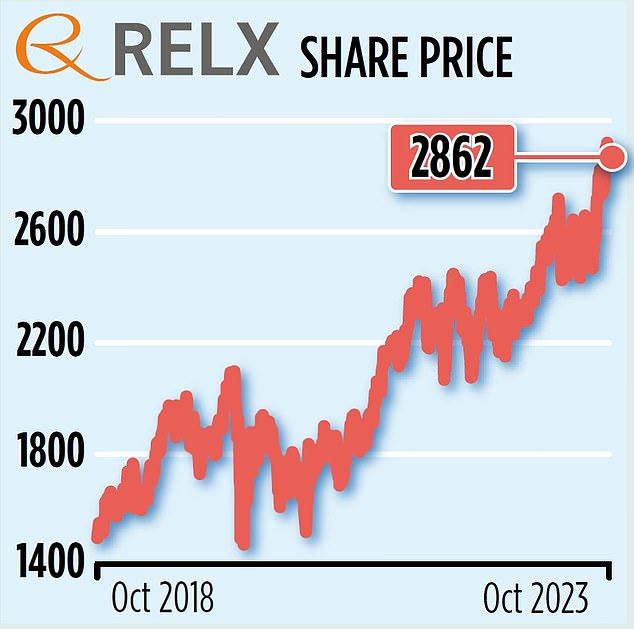One heady day this month, Relx entered the top ten companies in the elite FTSE 100 index.
The glory was short-lived. The next working day it was leapfrogged by smoking giant British American Tobacco.
But it was moment of celebration for the bosses of one of the best-perfoming blue-chip businesses most people have never heard of – even if it is a staple for many big City investors.
Although it is far from being a household name, Relx is a £54 billion company and one of the few to have been a member of the Footsie since its inception in 1984.
It is better known by its previous name, Reed Elsevier, which came into being in 1993 when British trade magazine and book publisher Reed International merged with Dutch scientific publisher Elsevier.

The company changed its name to Relx – pronounced ‘Rel-ex’ – in 2015 and the publishing business has gone digital.
The company’s work also includes providing reams of data to businesses, selling software and running global conferences.
Every doctor and lawyer will have read crucial articles that have been through Relx.
Others may know it for its huge exhibitions such as the international property event Mipim or the MCM Comic Con, a Mecca for super-hero and sci-fi fans that usually comes with a lot of dressing up.
Relx has been the best-performing stock on the blue-chip index since 2012.
Anyone who had invested £1,000 in the shares 35 years ago – when detailed records began – would now have a holding worth £11,440.
An investment of £1,000 into the wider Footsie would be worth just £4,165.
Relx is also a major dividend payer. If all the payouts had been reinvested, that £1,000 would be worth some £35,860, according to Steve Clayton, head of equities at investment platform Hargreaves Lansdown. The company’s heritage dates back to a newsprint operation established by Albert E Reed in 1895. It was not until the 1970s that it moved into publishing and later abandoned the manufacturing part of the business.
Relx’s major strength has been to move with the times, shedding underperforming or peripheral parts of its business, as well as embracing new technologies.
The business employs more than 5,000 software engineers and was an early adopter of artificial intelligence (AI). A trading update last week for the third quarter of this year reported revenue was up eight per cent so far in 2023. Its half-year results showed a 12 per cent rise in profits to £1.35 billion.
Clayton said one of the secrets of its stock market success is that it is a ‘reliable dividend payer’.
‘Although it’s got a lot of history it’s still a very modern business that has been able to translate across into the digital age very successfully,’ he added.
Conferences and trade shows were hit in the pandemic but the events division at Relx has been defying some analysts’ expectations.
Roddy Davidson, media analyst at financial services group Shore Capital Markets, said: ‘Events and exhibitions have bounced back really strongly post-Covid.
‘There were some questions around whether people would come back to in person [events].
‘I think we can see quite decisively that that has not been the case.’




